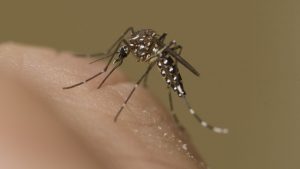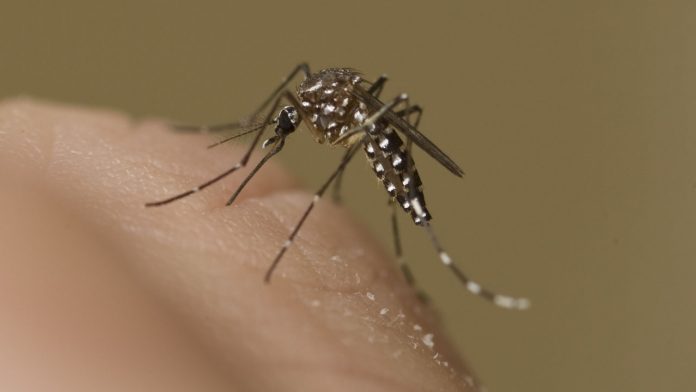 Denton County Public Health recently reported the fourth human case of West Nile Fever this season. The first was reported in July. The second was reported in early August with the third and fourth cases, both in Flower Mound, reported this past week.
Denton County Public Health recently reported the fourth human case of West Nile Fever this season. The first was reported in July. The second was reported in early August with the third and fourth cases, both in Flower Mound, reported this past week.
Last year, the West Nile Virus became more prolific in the last week of August and early September, according to county records. The season typically runs from the beginning of summer through early fall.
With a wetter-than-normal summer season this year and the prospect for more rain on the horizon, mosquitoes will continue to be prolific in the region, necessitating an ongoing need for the use of mosquito repellent.
According to the Texas Health and Human Services, North Texas has been the most active portion of the state this year as of Aug. 22. The state has recorded 701 mosquito pools positive for West Nile with 20 cases of West Nile Fever and 16 cases of the more serious neurological illness – West Nile Neuroinvasive Disease. Two deaths have been reported to date. In 2016, a total of 118 people contracted an illness from the virus.
Across the U.S., human cases of West Nile Virus have been reported in all but a few states this year, according to the Center for Disease Control and Prevention (CDC).
In Denton County, an estimated 60 positive mosquito pools have been reported as of Aug. 23, including 18 in Lewisville and 11 in Little Elm. Three positive pool tests have been reported in Flower Mound with two each in Highland Village and The Colony.
West Nile virus is typically spread through the bite of infected mosquitoes. It can also be spread through blood transfusions, organ transplants, breastfeeding and in pregnancy from mother to child, although these transmissions are not frequent.
People age 50 and older are at higher risk for severe illness from the virus. And, the more time spent outdoors, the higher the risk of being bitten by an infected mosquito.
An estimated 80 percent of the people infected with West Nile Virus show no symptoms. Mild symptoms of West Nile Fever affecting just under 20 percent include fever, headache, nausea, vomiting, body aches and swollen lymph nodes. Serious symptoms of the West Nile Neuroinvasive Disease, which affect less than 1 percent, include: high fever, headache, neck stiffness, stupor, disorientation, tremors, convulsions, muscle weakness, vision loss, numbness, paralysis or coma.
The incubation period – referring to the time between a mosquito bite and the presence of symptoms – is three to 14 days. Symptoms of West Nile Fever typically last a few days. Symptoms of West Nile Neuroinvasive Disease can last several weeks to several months with some neurological effects becoming permanent.
There is no cure for the virus but anyone with symptoms who believes they are infected should seek a medical evaluation from a physician or medical clinic such as Rapid Med Urgent Care Center. Typically, a blood test is taken if you have symptoms of the virus. Though no vaccine or cure is available, a physician will evaluate your symptoms and prescribe a treatment plan if necessary.
Dogs and cats can contract the virus through mosquito bites but they do not become ill from the virus. The only known domestic animal to show illness from the virus are horses. They can develop fever and encephalomyelitis.
There are currently no known cases in which the virus has spread from person to person or animal to person.
The West Nile Virus was first reported in the U.S. in October 1999 when the CDC reported an outbreak of arboviral encephalitis cases affecting people in New York City. The first case in Denton County was reported in 2002. West Nile Virus was first noted in Uganda in 1937, according to the National Institutes of Health.
Wild birds are the main hosts of the virus, which is then picked up by mosquitoes who bite the birds and then bite humans, transmitting West Nile Virus via the bite.
Residents can limit their exposure to the virus by taking the following steps:
- Drain standing water in potted plant saucers or other items that can hold water around your home
- Change water in birdbaths or wading pools every three to four days
- Clean debris from rain gutters
- Check for trapped water in tarps used to cover boats or other items around your home.
- Clean and chlorinate swimming pools or hot tubs
- Clean out water troughs used for livestock on a weekly basis
- Check with your community about the availability of BTI briquettes (or mosquito dunks) that can be left in standing water that cannot be eliminated
- Mosquitoes are more prolific during rainy seasons and are most active at dusk and dawn, although that does not mean you will not have a mosquito bite during the day
- Use insect repellent containing DEET, Picaridin or Oil of Lemon Eucalyptus when spending any time outdoors and be sure to read the label instructions so that you can follow the proper guidelines
- Wear long sleeve shirts, pants and socks when working outdoors to reduce your skin exposure
For additional information, visit the Denton County Public Health website.














 GIF.gif)


